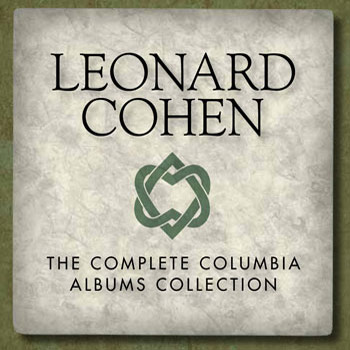
The Complete Albums Collection
Legacy
As the title plainly states, The Complete Albums Collection compiles the entirety of Leonard Cohen’s catalog. With the legendary singer-songwriter having only recorded for Columbia Records, their reissue imprint, Legacy, has been able to issue this box of all 17 of his records (as well as a smaller version of just Cohen’s 11 studio records), with each CD containing a remastered album and packaged in cardboard replica sleeves.
It’s an equally handsome and voluminous package, and one that probably should be absorbed over time, each album given its own lease on one’s headspace for however long is needed. But then I’d be writing this review sometime next year. As such, I committed two days to listen to what had taken Cohen 42 years to amass.
However superficial such an endeavor might seem on the surface, there are certain things one gleams when taking in this poetic playboy. He’s not so hot with album titles and is all about the songs. First there was Songs of Leonard Cohen (1967) , then Songs from a Room (1969) and Songs of Love and Hate (1971). His first live album? Live Songs (1973), of course. Later on we got Recent Songs (1979), Ten New Songs (2001) and Songs from the Road (2009).
That’s not so surprising really. Cohen was a poet-turned-songwriter, imbibing his folkish forays with inspiration from Blake and Keats. As much as one wanted to consider Dylan and Morrison (Van, not Jim) literary equals to the wordsmiths who had come before them, Cohen was the only one following that hollowed tradition. His songs were heavy with Biblical allusions, and his quatrains seemed more studied than his contemporaries.
You also notice that Cohen digs the word “naked.” On “Memories” (from Death of a Ladies Man), he intones, "I said all my faith to see her naked body," with the piousness of a monk that he would eventually become. In further religious allegory, he sings, “Great Babylyon was naked, oh she stood there trembling for me,” and on “You Know Who I Am” (from Songs from a Room), he comments, “Sometimes I need you naked, sometimes I need you wild.” Again on “Take This Longing,” he says, “I love to see you naked over there, especially from the back,” then once more on “Please Don’t Pass Me By,” he asks, “Won’t you be naked for me?” Again on “Waiting for the Miracle” from The Future, he reveals that “Most of you was naked. Ah, but some of you was light.” And once more on “Tonight Will Be Fine,” he sings, “She’s the soft naked lady love meant her to be.” (Sorry, I know this is getting tedious.) And on “Ain’t No Cure for Love” from I’m Your Man, he reveals, “I need to see you naked, in your body and your thought.” I know there’s at least a few more examples, but I’ve already tested your patience.
Oh, and the other thing is that he’s made quite a few live records, six to be exact. I’m not sure what all this has to say—other than Cohen obviously prefers his women naked and is into live recordings—but having listened to more than 12 hours of Leonard Cohen in two days, I can tell you that there is no growing tired of the man. He’s created an oeuvre that’s unique to itself, so he rarely sounds like he’s trying to be anyone other than himself, though admittedly there’s moments during his latter output (I’m Your Man and The Future) that haven’t survived the test of time. Otherwise, though, from 1969’s “The Partisan” to 1974’s “Chelsea Hotel” to 1984’s “Hallelujah,” Cohen has aged with the decades better than most of his contemporaries. He’s become the iconic singer-songwriter, the type of man who embodies his songwriting. I don’t think he was even that good of a writer (don’t bother reading Beautiful Losers), but between his voice and his ability to match metaphors to music, he’s one of the greats.
Stephen Slaybaugh
PAST PERFECTS
Void, Sessions 1981-83
Fac. Dance: Factory Records 12" Mixes & Rarities 1980-1987
Gregory Isaacs, The Ruler: 1972-1990
The Jimi Hendrix Experience, Winterland
Social Climbers
This May Be My Last Time Singing
Superchunk, Foolish
The George-Edwards Group, Archives
Scrawl, Velvet Hammer
Patti Smith, Outside Society
Bobb Trimble, Crippled Dog Band
Iggy Pop, Roadkill Rising... The Bootleg Collection 1977-2009
Archers of Loaf, Icky Mettle
Culture, Two Sevens Clash
